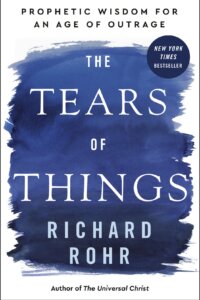
The Tears of Things: Prophetic WIsdom for an Age of Outrage
by Richard Rohr, OFM
Convergent Books, 2025, 205pp
reviewed by Gregory Houck, O.Carm.
Father Richard Rohr, OFM, calls his newest book “The Tears of Things: Prophetic Wisdom for an Age of Outrage” from a line from Virgil overlooking the aftermath of a Roman battle with Carthage and cries, “Everything is in tear; everything deserves tears.” This same cry, Fr Rohr says, is the cry of all the prophets in the Bible. As one reads through any of the Prophets, you will see how each Prophet begins with with self-righteous denunciations filled with rage and resentment over some infraction. The Prophet’s ego is tightly tied to the message. If his message is not received, he gets angry and the denunciations escalate. But as you continue reading, you will see the Prophet begins to mellow. Instead of denouncing the people, he begins to pity the people and to show compassion, coming to tears over how clueless they are. And his pity and compassion then grows to encompass more than the People of Israel to encompass all peoples. And he realizes that God’s pity and compassion is the same; not begrudgingly given only to well-behaved people of Israel; rather, given abundantly to all peoples. And the Prophet is moved to tears of joy over the lavish gift given to everyone. Rohr writs, “the prophets have a slow but real movement from extended rage and anger, though different forms of holy disorder, to tears and sadness, and then morphing into compassion as their mature response to evil and injustice” (page 113).
Fr Rohr then examines each of the Prophets to illustrate this movement in each — Jeremiah, Elijah, Jonah, John the Baptist, Isaiah (the various sections) and Ezekiel — giving the reader a good summary of each Prophet’s message along with his historical circumstances. Some of these Prophets he calls “unfinished” if their message has not expanded into compassion; for example, John the Baptist does not get much beyond his “you brood of vipers” message because his life is cut short by Herod.
This book is not only a historical examination of the Prophets; the book then moves into Prophecy in our times. Everyone has an opinion; everyone is angry; everyone is denouncing something (the other political party, other cultures or groups, other generations). Rohr writes, “if we stay with our rage and resentment too long we will righteously and unthinkingly pass on the hurt in ever new directions and we injure our own souls in ways we don’t even recognize. This is killing our postmodern world.” Fr Rohr calls us instead to follow the same path of maturation that we see in the Prophets. He writes, “Like the prophets, we also must grow and change and move from dualistic anger to empathetic tears — and we must recognize that God has done the same” (page 150). This is the wisdom of the Prophets.
